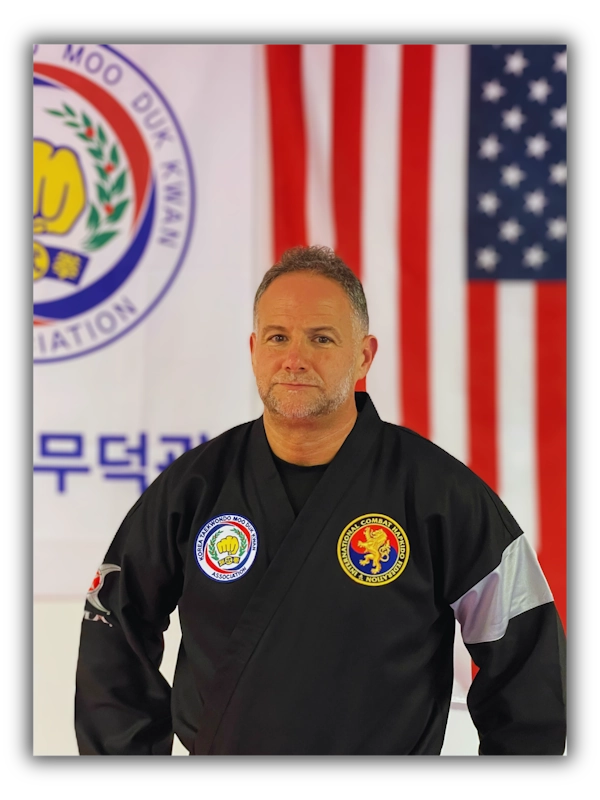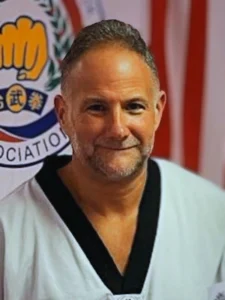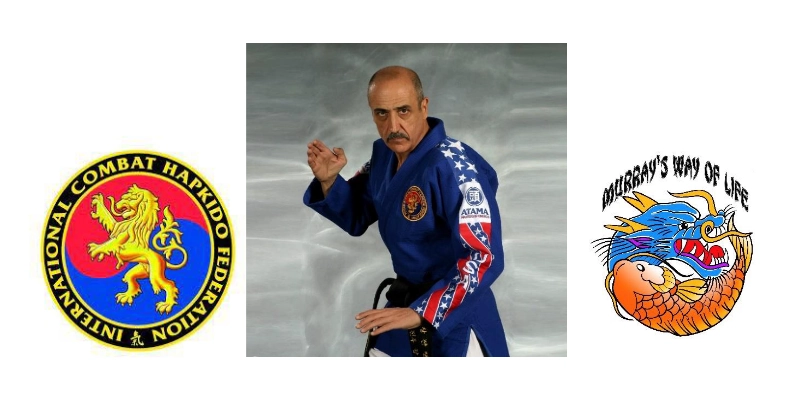About Us
COMBAT HAPKIDO TAEKWONDO SELF DEFENSE

Grandmaster KJN R. Shane Murray
8TH DAN
GM Shane Murray has spent his lifetime devoted to martial arts with over 35 years experience. He began studying Taekwondo as a teenager, teaching at age 15 and went on to earn his first black belt under Byung H Choi.
GM Shane Murray later began studying Hapkido in 2006 and received his first black belt in Hapkido in 2008. He opened his first charter ICHF school in 2009. GM Shane Murray has conducted many self defense clinics for the community and local schools. He has organized multiple charity board breaking events, and various demonstrations to expand awareness regionally. He has hosted regional ICHF seminars and has also been asked to be a guest tactical instructor for Warren County Sheriff’s Department and BOCES Criminal Justice program on numerous occations.
In addition to having certified Taekwondo Moo Duk Kwan Charter, currently, GM Shane Murray holds the area’s only certified ICHF Combat Hapkido Charter in the Capital Region
-
5th Dan Black Belt International Master World Kido Federation
-
6th Dan Black Belt International Combat Hapkido Senior Master under GM John Pellegrini
-
7th Dan Black Belt Taekwondo Kukkiwon Grandmaster under Byung H. Choi
-
8th Dan Black Belt Taekwondo Moo Duk Kwan Grandmaster under Byung H. Choi

10th Dan Grand Master John Pellegrini to visit the Capital Region
For the first time ever, the founder of the internationally acclaimed modern style of Combat Hapkido - John Pellegrini, will be bringing his seminar to the Capital Region, in Glens Falls, NY, Oct 5, 2024. Reserve your tickets today! - Hosted by Murray's Way of Life
What we can offer
Benefits of Martial Arts
Learn to Fight!
AND Improve Your MIND, BODY, and SPIRIT
Memory, Retention, Confidence, Self Control, Problem Solving, Adaption
Balance, Coordination, Flexibility, Muscle, Tone, Endurance
Patience, Respect, Integirty, Humility, Perseverence
FAQs
Frequently Asked Questions
You have questions, hopefully we have the answers for you.

This is just the beginning, we just launched. We thank you for visiting and hope you enjoyed the experience. And appreciate your patience while we work out the bugs and find more ways to improve. Check in again for more updates as time goes on!
The time it takes to become proficient varies widely based on factors, but at Murray's WOL we encourage 4. 6 hours a week for in-person training, and recommend you practice what you have learned to demonstrate the following week and then you are ready to progress. You therefore are only limited by your dedication, and natural aptitude, but do this and your belts will come more regularly than you wold think.Proficiency is a lifelong journey, and progress can be seen at every level.
Again, the frequency of training depends on your goals and schedule. Some practitioners train several times a week, while others train less frequently. Consistency is key to progress and that's why we strongly recommend you train 3 days a week with us, and practice what you learn at home to retain you new knowledge, develop, and refine hour skills.
As long as we still have availability, you will be able to join immediately in the next rotations of classes. Regardless of your skill level, everyone benefits from the trainings, and when need be, the higher level belts are always ready and willing to help their lower belt fellow members.
Students are evaluated based on their proficiency in techniques, forms (also known as kata), sparring ability, and sometimes knowledge of theory and philosophy. Time and Dedication:Earning a new belt requires consistent training, dedication, and often, a demonstration of understanding of the principles and philosophy of the art.
Training Period - The time between gradings can vary widely. In some schools, it's based on a set number of classes or months of training, while in others, it's more flexible and based on individual progress.
Demonstration of Skills - During a grading, students typically demonstrate various techniques, forms, and sometimes engage in sparring sessions to show their proficiency. In some cases, there may also be written or oral exams.
Instructor Assessment - Instructors or a grading panel evaluate the students' performance and determine whether they meet the criteria for advancement.
Time and Dedication - Earning a new belt requires consistent training, dedication, and often, a demonstration of understanding of the principles and philosophy of the art.
Ultimately, both Karate and Taekwondo provide a structured framework for personal growth, physical fitness, and self-defense. The specifics may vary, but the underlying principles of discipline, respect, and continuous self-improvement are central to both. Both styles have the same origins, and as such are rather quite similar.
But one principle difference could be with regard to Sparring Style: Though sparring style can vary. Taekwondo sparring often involves more dynamic, high-kicking movements and throws, while Karate sparring may include a wider range of techniques, particular emphasis on arms, elbows and hands with regard to blocks and punches..
Philosophical Emphasis:
One othee point worth noting. may be regard to how each art may have its own unique philosophical underpinnings. Karate, for example, often emphasizes self-discipline, humility, and self-improvement. Taekwondo places importance on the five tenets: courtesy, integrity, perseverance, self-control, and indomitable spirit.
There is no penalty for not being able to attend one of trainings, although we highly recommend you do try to make it so you have a better chance moving forward towards your goal and so to have a higher likelihood of retaining and moving through the lessons.
The time it takes to become proficient varies widely based on factors, but at Murray's WOL we encourage 4. 6 hours a week for in-person training, and recommend you practice what you have learned to demonstrate the following week and then you are ready to progress. You therefore are only limited by your dedication, and natural aptitude, but do this and your belts will come more regularly than you wold think. Proficiency is a lifelong journey, and progress can be seen at every level.
When taught by qualified instructors and practiced responsibly, martial arts can be safe. Injuries are relatively rare, but like any physical activity, there's always a risk. Proper warm-up, technique, and equipment are important for safety. We haven't experienced any injury every considered serious, we take everyone's safety and security quite seriously.
Wear comfortable, breathable clothing like a t-shirt and athletic pants. As you progress, you might need specific uniforms or equipment depending on the style.
Both Karate and Taekwondo often use a color belt system to signify a student's rank and skill level. Beginners usually start with a white belt, and progress through various colors (e.g., yellow, green, blue, etc.) until they reach higher levels.
The lessons continue long after one attains black belt status and move into what are known as the Black Belt Levels. Achieving a black belt is often a significant milestone in these arts. Once a student reaches this level, further advancement involves earning higher dan (degree) ranks, indicating greater expertise.
Pricing - DUAL BELTING
- Combat Hapkido is Included
- Taekwondo is Included
- Learn Two Styles, at the Same Time, for the Price of One!
Pricing - Self Defense - Group Rate
- Train with a Martial Arts Grand Master!
- Learn Self-Defense
- 3 hour self defense seminar (up to 16 participants) $800
- Receive Dual Belt Training for One Low Price
- Train Only with Other Adults Always
- Train at Your Own Pace
- Excellent Instruction Provided by 35 Year Martial Arts Master
Register Membership
Get only the best training, on us!
If you’re looking for something different, and not sure if this is right for you, no problem.
TRY US FOR FREE!

Grand Master KJN R. Shane Murray
"My focuses are dual belting for Taekwondo, and I am the only certified Combat Hapkido instructor in our area. Combat Hapkido is a modern realistic self defense program perfect for the average person to be able to practice and perform. These are things that separate what we do from the other schools."



